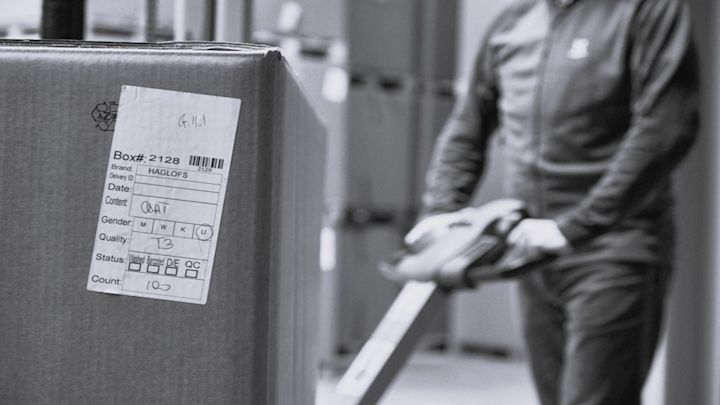
Why skip Black Friday if we’re going to have sales anyway?
October 2023
Most brands have sale periods. Traditionally used as a means to keep stock levels in check, sale periods typically happen towards the end of each season—helping to clear out the old and make room for the new. But you may have noticed a trend among brands this year of holding sales more frequently than ever before (Haglöfs included). What’s the deal?
The short answer is that it comes down to a combination of current marketplace conditions and (at least on our part) a failure to accurately forecast demand. Both of which have added up to too much stock.
Now, you might ask: If you have too much stock and sales periods are a normal part of doing business anyway, why take a stand against Black Friday? Isn’t that hypocritical?
No, we don’t think it is. Let us explain.
When there’s too much stock, the industry pays the price.
Considering the number of sales we’ve had this year, it might look like we’ve had a few Black Fridays of our own already. But we haven’t. We’ve had more sales because we have too much stock. There are a lot of external factors we can point to and will explain below, but we mostly have ourselves to blame.
A complex market combined with supply chain disruptions made forecasting especially tricky in recent years. While the pandemic increased demand for outdoor gear, a mix of other factors that have emerged on the world stage did just the opposite. Like most outdoor brands, when demand increased we produced more. But then war and inflation forced many consumers to adjust their spending habits. When your basic needs are at stake, what are you going to spend your money on, food and electricity or a 300 euro waterproof jacket?
Adjusting to lower demand isn’t as simple as canceling orders at our factories. Since quality clothing takes time to produce, we have to place orders up to a year in advance. So, for us, cancelling orders would mean canceling the wages our suppliers and factory workers were already counting on. And we’re not going to do that.
So, to balance out our stock levels we hold sales in our stores and on our website. But unlike sales sprung from systematic discounting practices, the items we discount have been produced at their regular cost. In other words, when we have sales, we take a margin hit.
Black Friday vs. Regular sale periods
There is a big difference between Black Friday and regular seasonal sales and discounts.
Black Friday started out as just another seasonal sales event, but today it has grown into one of the most notorious shopping days of the year with systematic and large-scale discounting in full force. Brands forecast massive sales and often produce discounted products made especially for Black Friday with the sole aim of increasing sales even more.
The problem with systematic discounting is that it keeps prices artificially low. This, in turn, increases pressure on the supply chain to keep costs down. And when producers are faced with downward price pressure, it ends up negatively affecting labor costs and factory workers’ wages. This gives rise to cascading labor issues since workers may work excessive overtime in poor working conditions to compensate for lower salaries. What’s more, too-low prices lead to excessive consumption, which puts even greater pressure on the environment.
Regular sale periods are different.
What makes regular sale periods and discounts different from Black Friday is the fact the products are produced at their regular cost, and the people who make the products are paid their regular salaries. The primary aim of regular sales is to reduce stock levels. Any price reductions only affect the bottom lines of the brand and retailers, but not anyone else along the production line.
This isn’t to say that regular sale periods aren’t without flaws. Selling clothing at a fair price without driving excessive consumption is a tough balancing act.
Why are we skipping Black Friday again?
We have been taking a stand against the environmental and social perils of excessive consumption for many years now. Our aim has been—and will always be—to draw attention to the problem of systematic and large-scale discounting as a means of driving sales.
During past Black Friday sales events, we have responded with actions like increasing our prices, giving all profits to charities, and promoting second-hand instead of newly produced products. This year, like last year, we are closing all our stores.
But does closing down on Black Friday even make a difference?
Maybe not. But we still believe it is important to take a stand against Black Friday. Doing so helps spark important conversations about the problems brought on by systematic and large-scale discounting. We just can’t stand around doing nothing when we know this practice is leading us all in the wrong direction.